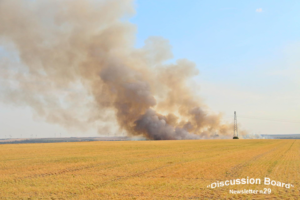OF Discussion Board n°29 – 24 June 2022
 Question asked : According to many observers, the world is now facing the prospect of a global food crisis, with the weakest potentially hit the hardest. Is the conjunction of war and poor harvest forecast the only cause of the crisis or do other underlying structural weaknesses in the world food system also play a role? What can/should be done about them?
Question asked : According to many observers, the world is now facing the prospect of a global food crisis, with the weakest potentially hit the hardest. Is the conjunction of war and poor harvest forecast the only cause of the crisis or do other underlying structural weaknesses in the world food system also play a role? What can/should be done about them?
Thanks for those of our contributors who ventured to react to the this question posed in this Discussion Board.
“Hurricane of hunger”: discovering the fragility of our food systems
by Virgile Perret & Paul H. Dembinski
|
UN Secretary-general Guterres has warned that Russia’s invasion of Ukraine, coupled with the Covid pandemic and climate change, ‘threatens to tip tens of millions of people over the edge, into food insecurity followed by malnutrition, mass hunger and famine… we must do everything possible to avert a hurricane of hunger and a meltdown of the global food system’.
That is very true. However, the problem is made even worse because, as Etienne Perrot points out, ‘the food deficit affects the poorest more than the richest – even in wealthy countries. But, eventually, we will all be affected – a point made recently by the Governor of the Bank of England, when he called food price rises ‘apocalyptic’.
What is driving this concern which is shared by many? The conventional explanation is Russia’s invasion of Ukraine, which has sharply reduced exports by two of the world’s leading grain producers, coupled with the lingering effects of the pandemic. That is correct as far as it goes. However, these are ‘situational’ factors; we need also to look at underlying ‘structural’ factors, as emphasised by Yuriy Temirov writing from Ukraine, such as the concentration of global food markets and the oligopolistic power of the multinational agribusiness industry. That may have contributed to greater economic efficiency over the years, but it has also made the global food system less resilient by minimising storage and by increasing reliance on imports over domestic production. Hence, as Temirov puts it, ‘Putin’s use of food as a weapon… is not the cause of the crisis; it just turns a crisis into a catastrophe’.
What should be done? We need to diversify – geographically, in terms of the crops we produce and in terms of the techniques we use. As Valerio Bruno points out, we also need to ‘discourage livestock breeding and meat consumption, and redirect resources to sustainable agricultural practises’ – a point also made by Andrew Cornford, who emphasises the diminishing marginal returns of large-scale irrigation and the over-use of fertilizer and pesticides.
Russia’s invasion of Ukraine is, therefore, a wake-up call for governments around the world – demonstrating just how fragile our global food system is. That fragility is not new, but, until now, policymakers have been able to ignore it. Unfortunately, economic and geopolitical turbulence is likely to become more and more ‘normal’ in the future – and that makes it even more important to build resilience into the global food chain now, and to protect those most vulnerable to food supply shocks.
|
  |

| « … the food deficit affects the poorest … ”
Because of the weight of food in household budgets, the food deficit affects the poorest more than the richest – even in wealthy countries. In addition to Russia’s blockade of Ukraine and the current bad weather conditions in the rest of the world, there are three structural conditions. Firstly, the importance of meat consumption and livestock production at the expense of plant-based food production. Secondly, access to water for reasons of river management across borders and for national reasons of the prevalence of local community interests over wider solidarity. Finally, the specialization of arable land in industrialized agricultural production. Only agrarian reform – and not lower input prices – can overcome these structural deficits.
Etienne Perrot
Jesuit, Dr. Economics sciences, editorial board of the magazine Choisir (Geneva), editorial adviser of the journal Études (Paris)
|
 |
| « … the world is confronted with a double food crisis … ”
The world is currently confronted with a double food crisis. One part is due to the effects of the current war in Ukraine on global supplies of grain, fertilizer, diesel, natural gas, propane and other inputs into agricultural production, combined with disruption of maritime transport. The other is longer term in character: almost 10 per cent of the global population of 8 billion are already undernourished and by 2050, according to the FAO, there will be another 2 billion mouths to feed, while land and water resources are stretched to “a breaking point”. Alleviating the first part will require a speedy negotiation of the end of the war. The second part must be dealt with at a time when the limits are evident of boosting agricultural productivity by irrigating more land and increased recourse to fertilizer and pesticides.
Andrew Cornford
Counsellor, Observatoire de la Finance; past staff member of UNCTAD, with special responsibility for financial regulation and international trade in financial services
|
 |
| « … Putin’s use of food weapons in the war against Ukraine is not the cause of the food crisis … ”
The current global food crisis results from a complex interplay of systemic and situational factors. The systemic shortcomings (world disorder; the West’s confusion in confronting authoritarian regimes; the inability of international institutions to effectively promote the underdeveloped countries’ sustainable self-sufficiency in food) exacerbate the consequences of situational factors (wars, crop failures, natural disasters), and facilitate the use of an arsenal of the hybrid weapons (food or energy, for example) by authoritarian regimes. Thus, Putin’s use of food weapons in the war against Ukraine, for example, is not the cause of the food crisis; it only contributes to turning a crisis into a catastrophe.
Yuriy Temirov
Assoc. prof., Dean of Faculty of History and International Relations, Vasyl Stus Donetsk National University
|
 |
| « … focusing attention world-wide on needed food security … ”
Sadly, the prospect of famine is once more man-made, to a large extent, and driven by politics and conflict. Ukraine under Stalin suffered one of the worse famines in history, Russian and Ukrainian products are now some of the global keys. Despite war, there may still be possibilities of agreements on Black Sea grain shipping. The crisis requires immediate relief action in Yemen, Ethiopia, Afghanistan and others.It should also help us focusing attention world-wide on needed food security, farmer-centric policies to expand food production: AI use in agriculture, control of middlemen power, value-sharing clauses in supply chains, (provisional) restrictions on the use of crops for biofuels… Cooperation among countries is vital, instead of national protectionism.
Domingo Sugranyes
Director of a seminar on ethics and technology at Pablo VI Foundation, past Executive Vice-Chairman of MAPFRE international insurance group
|
 |
| « … discourage the use of resources directed to livestock breeding and meat consumption …”
The problem of structural weaknesses in the food system is complex and can be approached from many perspectives. What I would suggest here is to reflect on international policies that could work in the direction of systematically discourage the use of resources directed to livestock breeding and meat consumption and divert them towards sustainable agricultural practices.If one just takes into consideration water, according to the Water Footprint Network, it is way more efficient to obtain calories, protein and fat through crop products than animal products: e.g. the water footprint per gram of protein is 1.5 times larger in chicken meat, and 6 times larger in the case of beef meat!, than for ordinary vegetable.
Valerio Bruno
Researcher in politics and Senior Research Fellow at the Centre for Analysis of the Radical Right (CARR)
|
 |
 Question asked : According to many observers, the world is now facing the prospect of a global food crisis, with the weakest potentially hit the hardest. Is the conjunction of war and poor harvest forecast the only cause of the crisis or do other underlying structural weaknesses in the world food system also play a role? What can/should be done about them?
Question asked : According to many observers, the world is now facing the prospect of a global food crisis, with the weakest potentially hit the hardest. Is the conjunction of war and poor harvest forecast the only cause of the crisis or do other underlying structural weaknesses in the world food system also play a role? What can/should be done about them?







